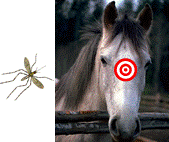 With all of the rain Florida has received the last two months, the mosquito population has increased dramatically. Mosquitoes are the vector or carrier for viruses that can be transmitted from wild birds to humans and horses. Through August there have not been any cases of Eastern Equine Encephalitis (EEE) or West Nile Virus (WNV) reported in horses in the Panhandle. The Florida Department of Health has sentinel chickens it uses to survey for the disease and tracks reported cases of human and horse disease.
With all of the rain Florida has received the last two months, the mosquito population has increased dramatically. Mosquitoes are the vector or carrier for viruses that can be transmitted from wild birds to humans and horses. Through August there have not been any cases of Eastern Equine Encephalitis (EEE) or West Nile Virus (WNV) reported in horses in the Panhandle. The Florida Department of Health has sentinel chickens it uses to survey for the disease and tracks reported cases of human and horse disease.
Twenty-eight positive equine for Eastern Equine Encephalitis virus and two equine positive for West Nile virus have been reported for 2013. Sixty-five sentinel chickens tested positive for antibodies to West Nile virus, one hundred-twenty four to Eastern Equine Encephalitis and two to St. Louis Encephalitis virus in 2013.
Florida Department of Health
 From the map above you can see that these diseases are present in the Panhandle. Horses in peninsular Florida have contracted these disease this year. Make sure your horses are current on their EEE and WNV vaccinations. If it has been more than six months since they received a EEE shot, or more than a year since the last WNV shot, then it is time for a booster. These viral diseases affect the nervous system of horses, and in many cases, infected horses die or must be euthanized.
From the map above you can see that these diseases are present in the Panhandle. Horses in peninsular Florida have contracted these disease this year. Make sure your horses are current on their EEE and WNV vaccinations. If it has been more than six months since they received a EEE shot, or more than a year since the last WNV shot, then it is time for a booster. These viral diseases affect the nervous system of horses, and in many cases, infected horses die or must be euthanized.
Even though summer is winding down, the mosquitoes are still buzzing and these viral diseases are present in our area. These viral diseases are preventable, as long as we booster frequently enough to continuously stimulate the immune system against them. Horses don’t have a choice, they must live in the same environment as the mosquitoes. There are no human vaccines, so we must use common sense and repellents and do our best to minimize exposure to mosquito bites that might carry diseases.
- November 2025 Weather Summary & Winter Outlook - December 5, 2025
- Friday Feature: The History of Beekeeping - December 5, 2025
- Friday Feature:Malone Pecan Festival Tractorcade - November 21, 2025
